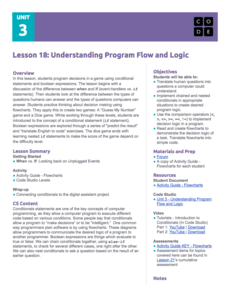Curated OER
Conceptual Analysis in Economics
Students practice critical thinking skills by defending their beliefs orally in a "hot seat". In addition, they communicate their feelings about an inssue in writing.
Curated OER
Math Series: Number Patterns
The focus of this math lesson is representing numbers in different ways. Young mathematicians practice putting numbers into sets, and arriving at answers in new ways. For example, they are asked to, "Show me how to get 7 eyes." A...
Education Bureau of Hong Kong
Fundamentals of Critical Thinking
Analyzing arguments is key to critical thinking. Colorful slides teach viewers how to recognize the structure of an argument, the claims, and the validity of the evidence used to support an argument. Then, provided scenarios permit...
Code.org
Understanding Program Flow and Logic
Explore decision-making logic in programming computer games. The 10th installment of a 21-part unit teaches scholars how to apply conditional statements and Boolean expressions. They use these concepts to create a "Guess My Number" game...
Royal Society of Chemistry
Extraction of Copper
Is copper found as a raw material? Science sleuths manipulate the reactants and products found in the copper extraction process in a series of fun puzzles. The interactive engages learners in pairing formulas with their names while using...
Two Lives Left
Cargo-Bot
What would you think of an app that provides a creative introduction to an important 21st century skill, challenges learners at many levels, and is an addictively, fun game? Did we also mention it was free? We think you will find all...
Curated OER
Say What? (A Murder Mystery)
Students practice their performance, expression, and logical thinking skills by asking questions and speaking in correct tones. They attempt to meet IEP requirements in these areas by presenting murder mystery clues using the appropriate...
Curated OER
How to Reason
Young scholars practice their logical thinking skills. In this reasoning lesson, students complete tasks involving geometric shapes, place value, and odd/even numbers.
Mathematics Vision Project
Module 6: Congruence, Construction, and Proof
Trace the links between a variety of math concepts in this far-reaching unit. Ideas that seem very different on the outset (like the distance formula and rigid transformations) come together in very natural and logical ways. This unit...
Curated OER
I Think, Therefore
Students ponder a quote from Charles Darwin. In this logical thinking lesson, students explain the statement, "The price of butter depends on the number of old maids in the area."
Curated OER
House and Holmes: A Guide to Deductive and Inductive Reasoning
Test your pupils' reasoning skills with several activities and a quick mystery to solve. Learners watch and analyze a few video clips that demonstrate reasoning in action, practice deduction with an interactive and collaborative...
Royal Society of Chemistry
Compounds Ending in 'ate'
Tackle polyatomic ions with Sudoku-like games! Nomenclature novices practice identifying the names and constituents of carbonate compounds with a series of puzzles. Scholars can use the resource online or as a worksheet, thanks to the...
Curated OER
Improving Deductive Reasoning Skills
Students develop a strategy list for problem solving by working with different types of problems. They recognize problems that may be solved using deductive reasoning and solve deductive reasoning problems.
KenKen Puzzle
KenKen® Puzzle
Think inside the box with KenKen® puzzles to provide some problem solving practice. These puzzles are similar to Sudoku, but require computation inside designated boxes. There are multiple puzzles with a range of difficulties to...
Curated OER
Problem-Solving Strategy: Use Logical Reasoning
In this logical reasoning worksheet, students utilize the problem-solving strategy of logical reasoning to answer 2 short answer mathematical questions.
Curated OER
Section 1: Analogies
Introduce your freshmen to analogies with this packet of prompts that also includes strategies for solving these critical thinking puzzles.
Curated OER
Math Squares
It's Sudoku for beginners! Well, not exactly, but these math squares offer a fun way to practice addition for your learners. Each of the sixteen 3x3 squares has four numbers filled in. Scholars add the numbers across and down, then use...
Curated OER
Logic
High schoolers investigate the concepts related to the study of logic. They solve logic puzzles in order to stimulate thinking and engage different types of learners. The lesson plan includes helpful dialogue to use with students during...
Curated OER
Developing Thinking and Reasoning Skills in Primary Learners Using Detective Fiction
Students are introduced to the genre of detective fiction. Based on their reading level, they are given a different series of books to read. For each story, they are to make predictions and practice decoding messages. To end the...
Krzysztof Haft-Szatynski
Move the Turtle
Turtles are not known to be speedy movers, but have you ever tried to get them to move in a specific direction? How about getting them to move in a perfect circle? With this app, young computer programmers have to be on their toes to...
Curated OER
The House on Haunted Hill
Have your class practice problem solving and critical-thinking skills. Learners read a long story about an adventure involving a haunted house, make decisions about what the character should do, and evaluate the storytelling process.
Curated OER
Who am I?
For this reading comprehension and logical thinking worksheet, young students read descriptions and then guess the name of each one of the 8 bears.
Mathematics Vision Project
Geometric Figures
Logical thinking is at the forefront of this jam-packed lesson, with young mathematicians not only investigating geometric concepts but also how they "know what they know". Through each activity and worksheet, learners wrestle with...
Virginia Department of Education
Inductive and Deductive Reasoning
Introduce pupils to the two types of reasoning, inductive and deductive. Classmates work in pairs or small groups to learn the difference between the two and apply these reasonings to develop valid conclusions.

























